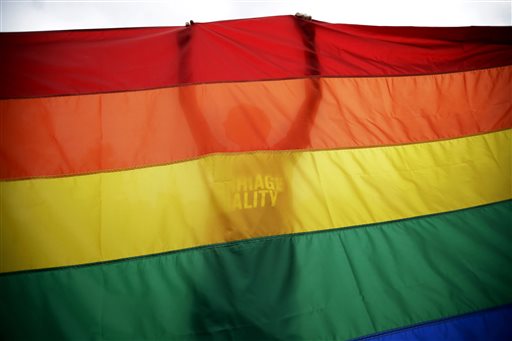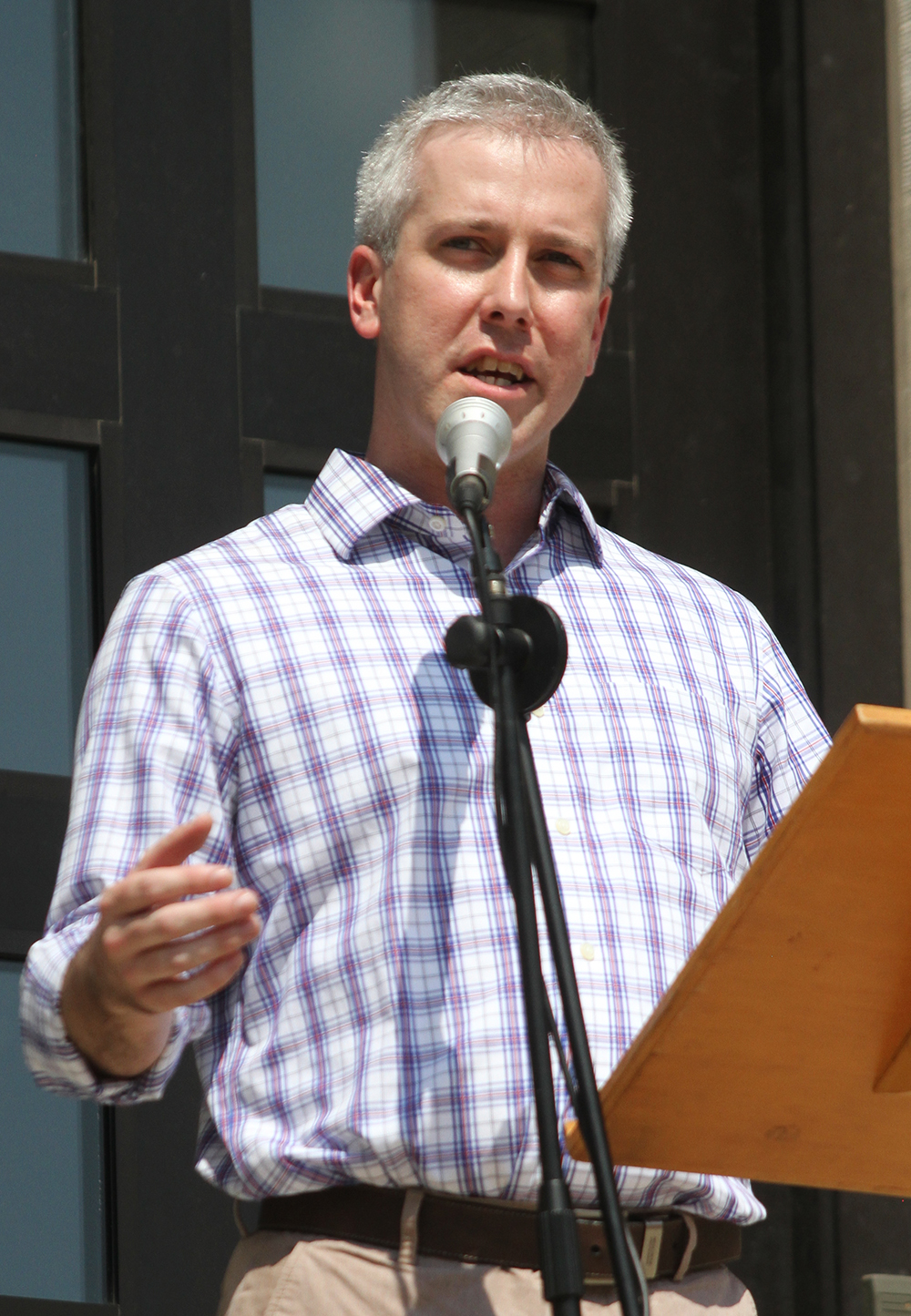In a break with appellate opinions around the nation, a federal court on Thursday struck a blow to the expanding acceptance of same-sex marriage in a ruling that upheld bans on such unions in Tennessee and three other states.
The 6th U.S. Circuit Court of Appeals in Cincinnati concluded in a 2-1 decision involving cases from Tennessee, Ohio, Kentucky and Michigan that states have the right to set rules for marriage.
The decision all but guarantees U.S. Supreme Court review.
"It's tailor-made for the Supreme Court to intervene," said Pierre Bergeron, a Cincinnati attorney who runs a blog following the appellate court's movements.
The Supreme Court decided "not to decide" on gay marriage cases last month, saying it will likely only intervene in the case of a split of authority. By differing from other U.S. appellate courts, the 6th Circuit created just such a split. At least two of the plaintiffs involved in the case have said they plan to appeal
"I am disappointed," said Matt Nevels past president of the Chattanooga chapter of Parents and Friends of Lesbians and Gays [PFLAG]. "However, it may be providential in that the Supreme Court will most likely be taking it up after having refused to hear it. Perhaps that will hasten the ruling by the Supreme Court, which will have more merit."
Meanwhile, conservative leaders are celebrating a win, however temporary. David Fowler, co-sponsor of Tennessee's constitutional amendment banning gay marriage, which was approved in 2006, also praised the decision, but said the fight is far from over.
"I hope that they would follow the reasoning of the 6th Circuit Court of Appeals and the reasoning in Windsor [the 2013 Supreme Court ruling that struck down the federal Defense of Marriage Act] that state marriage policy has historically been an issue left to the states," said Fowler, president of the Family Action Council and a former state senator from Signal Mountain.
"I think it underscores the reality that there is a divide in the country," said Mark West, president of the Chattanooga Tea Party. "They [the 6th Circuit majority] resisted the temptation to just go with the politically correct decision. This is a great victory for the people ultimately."
The issue appears likely to return to the Supreme Court for a final ruling whether states can ban gay marriage or that gay and lesbian couples have a fundamental right to marry under the U.S. Constitution. Thirty-two states recently asked the Supreme Court to settle the issue once and for all.
Circuit Judge Jeffrey Sutton wrote the majority opinion for the 6th Circuit Court of Appeals.
"When the courts do not let the people resolve new social issues like this one, they perpetuate the idea that the heroes in these change events are judges and lawyers," Sutton wrote. "Better in this instance, we think, to allow change through the customary political processes, in which the people, gay and straight alike, become the heroes of their own stories by meeting each other not as adversaries in a court system but as fellow citizens seeking to resolve a new social issue in a fair-minded way."
Sutton was joined by Judge Deborah L. Cook.
However, Judge Martha Craig Daughtrey, a former Tennessee Supreme Court judge who now serves on the 6th Circuit bench, dissented.
"The author of the majority opinion has drafted what would make an engrossing TED Talk or, possibly, an introductory lecture in Political Philosophy," Daughtrey wrote. "But as an appellate court decision, it wholly fails to grapple with the relevant constitutional question in this appeal: whether a state's constitutional prohibition of same-sex marriage violates equal protection under the Fourteenth Amendment. Instead, the majority sets up a false premise -- that the question before us is 'who should decide? ...'"
Chattanooga City Councilman Chris Anderson, the first openly gay councilman elected in Tennessee, said the court's decision is unfair for couples who only want equal treatment under the law. But he believes the setback is only temporary if the Supreme Court decides to hear the case.
"We'll see who comes out on top, the 6th Circuit Court or the rest of the circuits," he said. "The American people deserve to hear from [the Supreme Court.]"
The cases' plaintiffs will have 90 days to decide if they want to request a hearing by the Supreme Court or the full court of appeals. If the Supreme Court takes up the case, it is unlikely that it will be heard during this session, Bergeron said.
On his Facebook page, Lt. Gov. Ron Ramsey touted the ruling as a win for the state.
"Today's ruling by the Sixth Circuit Court of Appeals explicitly affirms our state's right to define marriage. This is a victory for states' rights and traditionalism in Tennessee -- but the final battle has not yet been fought," a post read.
There are nearly 11,000 cohabiting same-sex couples in Tennessee. An estimated 18 percent of them are raising nearly 4,000 children in their homes, according to the Williams Institute, a think tank that studies gender identity law and public policy at UCLA.
Tennessee's case is narrowly focused on the rights of three same-sex couples. Michigan's and Kentucky's cases stem from rulings striking down each state's gay marriage bans. Ohio's two cases deal only with the state's recognition of out-of-state gay marriages.
In a prepared statement, Nashville attorney Abby Rubenfeld, who represented the Tennessee couples, called the decision "deeply disappointing" and "inconsistent" with other decisions.
"We are hopeful that soon, the U.S. Supreme Court will rule that equal protection requires Tennessee, and every state, to treat same-sex couples and their children with the same respect as other families."
The high court on Oct. 6 unexpectedly turned away appeals from five states seeking to prohibit gay and lesbian unions. The court's order effectively made gay marriage legal in 30 states. The San Francisco-based 9th Circuit Court of Appeals the next day overturned same-sex marriage bans in Idaho and Nevada, the fourth federal appeals court to rule against state bans.
Before the 9th Circuit ruling, three other appellate courts -- the 10th Circuit in Denver, the 4th Circuit in Richmond, Va., and the 7th Circuit in Chicago -- overturned state gay marriage bans in Wisconsin, Indiana, Oklahoma, Utah and Virginia over the summer, ruling that they were unconstitutional.
U.S. Supreme Court Justice Ruth Bader Ginsburg recently told a Minnesota audience that the 6th Circuit's pending ruling would likely influence the high court's timing, adding "some urgency" if it allowed same-sex marriage bans to stand.
Plaintiffs include a Cincinnati man who wants his late husband listed as married on his death certificate so they can be buried next to each other in a family-only plot and a Tennessee couple who both want to be listed on their newborn daughter's birth certificate.
The Associated Press contributed to this report.
Staff writers Joy Lukachick Smith, Joan McClane and Andy Sher contributed to this report.
Contact staff writer Claire Wiseman at cwiseman@timesfreepress.com or 423-757-6347. Follow her on Twitter @clairelwiseman.
INTERACTIVE TIMELINE:
INTERACTIVE MAP:


